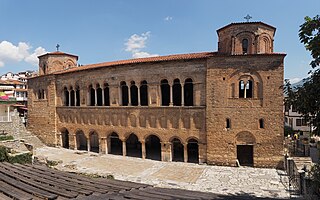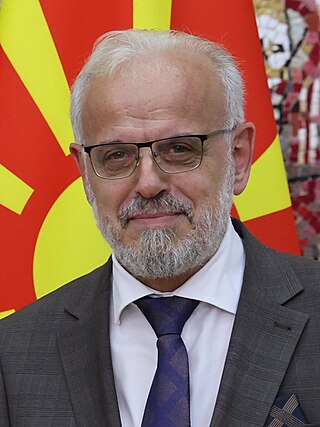
The North Atlantic Treaty Organization, also called the North Atlantic Alliance, is an intergovernmental military alliance of 31 member states – 29 European and two North American. Established in the aftermath of World War II, the organization implemented the North Atlantic Treaty, signed in Washington, D.C., on 4 April 1949. NATO is a collective security system: its independent member states agree to defend each other against attacks by third parties. During the Cold War, NATO operated as a check on the threat posed by the Soviet Union. The alliance remained in place after the dissolution of the Soviet Union and the Warsaw Pact and has been involved in military operations in the Balkans, the Middle East, South Asia, and Africa. The organization's motto is animus in consulendo liber.

2001 (MMI) was a common year starting on Monday of the Gregorian calendar, the 2001st year of the Common Era (CE) and Anno Domini (AD) designations, the 1st year of the 3rd millennium and the 21st century, and the 2nd year of the 2000s decade.

The National Liberation Army, also known as the Macedonian UÇK was an ethnic Albanian militant and separatist militia that operated in the Republic of Macedonia in 2001 and was closely associated with the Kosovo Liberation Army (KLA). Following the 2001 insurgency in Macedonia, it was disarmed through the Ohrid Framework Agreement, which gave greater rights and autonomy to the state's Macedonian Albanians.

The Islamic Movement of Uzbekistan was a militant Islamist group formed in 1998 by Islamic ideologue Tahir Yuldashev and former Soviet paratrooper Juma Namangani; both ethnic Uzbeks from the Fergana Valley. Its original objective was to overthrow President Islam Karimov of Uzbekistan and create an Islamic state under Sharia; however, in subsequent years, it reinvented itself as an ally of Al-Qaeda. The group also maintained relations with Afghan Taliban in 1990s. However, later on, relations between the Afghan Taliban and the IMU started declining.

"Muslims" is a designation for the ethnoreligious group of Serbo-Croatian-speaking Muslims and people of Muslim heritage, inhabiting mostly the territory of the former Socialist Federal Republic of Yugoslavia. The term, adopted in the 1971 Constitution of Yugoslavia, groups together a number of distinct South Slavic communities of Islamic ethnocultural tradition. Prior to 1993, a vast majority of present-day Bosniaks self-identified as ethnic Muslims, along with some smaller groups of different ethnicity, such as Gorani and Torbeši. This designation did not include Yugoslav non-Slavic Muslims, such as Turks, some Romani people and majority of Albanians.

The September 11 attacks, commonly known as 9/11, were four coordinated Islamist suicide terrorist attacks carried out by al-Qaeda against the United States in 2001. That morning, 19 terrorists hijacked four commercial airliners scheduled to travel from the New England and Mid-Atlantic regions of the East Coast to California. The hijackers crashed the first two planes into the Twin Towers of the World Trade Center in New York City, two of the world's five tallest buildings at the time, and aimed the next two flights toward targets in or near Washington, D.C., in an attack on the nation's capital. The third team succeeded in striking the Pentagon, the headquarters of the U.S. Department of Defense in Arlington County, Virginia, while the fourth plane went down in rural Pennsylvania during a passenger revolt. The September 11 attacks killed nearly 3,000 people, the most deadly terrorist attack in human history, and instigated the multi-decade global war on terror, fought in Afghanistan, Iraq, and elsewhere.

Muslims in North Macedonia represent just under one-third of the nation's total population according to the 2021 census, making Islam the second most widely professed religion in the country. Muslims in North Macedonia follow Sunni Islam of the Hanafi madhhab. Some northwestern and western regions of the country have Muslim majorities. A large majority of all the Muslims in the country are ethnic Albanians, with the rest being primarily Turks, Romani, Bosniaks or Torbeš.

The 2001 insurgency in Macedonia was an armed conflict which began when the ethnic Albanian National Liberation Army (NLA) insurgent group, formed from veterans of the Kosovo War and Insurgency in the Preševo Valley, attacked Macedonian security forces at the beginning of February 2001, and ended with the Ohrid Agreement, signed on 13 August of that same year. There were also claims that the NLA ultimately wished to see Albanian-majority areas secede from the country, though high-ranking members of the group have denied this. The conflict lasted throughout most of the year, although overall casualties remained limited to several dozen individuals on either side, according to sources from both sides of the conflict. With it, the Yugoslav Wars had reached Macedonia. The Socialist Republic of Macedonia had achieved peaceful independence from Yugoslavia in 1991.

The Albanian National Army, is an Albanian paramilitary organization which operates in North Macedonia, Serbia and Kosovo. The group opposes the Ohrid Framework Agreement which ended the 2001 insurgency in Macedonia between members of the National Liberation Army and Macedonian security forces.

In North Macedonia, the most common religion is Eastern Orthodox Christianity, practiced mainly by ethnic Macedonians, Serbians, Vlakhs, and Romanis. The vast majority of the Eastern Orthodox in the country belong to the Macedonian Orthodox Church, which declared autocephaly from the Serbian Orthodox Church in 1967.

The accession of North Macedonia to the European Union has been on the current agenda for future enlargement of the EU since 2005, when it became an official candidate for accession. The Republic of Macedonia submitted its membership application in 2004, thirteen years after its independence from Yugoslavia. It is one of nine current EU candidate countries, together with Albania, Bosnia and Herzegovina, Georgia, Moldova, Montenegro, Serbia, Turkey and Ukraine.

North Macedonia, officially the Republic of North Macedonia, is a landlocked country in Southeast Europe. It shares land borders with Kosovo to the northwest, Serbia to the north, Bulgaria to the east, Greece to the south, and Albania to the west. It constitutes approximately the northern third of the larger geographical region of Macedonia. Skopje, the capital and largest city, is home to a quarter of the country's 1.83 million people. The majority of the residents are ethnic Macedonians, a South Slavic people. Albanians form a significant minority at around 25%, followed by Turks, Roma, Serbs, Bosniaks, Aromanians and a few other minorities.
On the night of 28 October 2014 at around 22:00, the Macedonian government building was attacked with two projectiles, damaging the walls and roof of the building. No casualties were reported. Speculations have occurred that the event was linked to the then recent proclamation of the so-called Republic of Ilirida. The government building was also attacked by RPG rounds in 2007. A movement calling itself the National Liberation Army (NLA), a militant organization that fought against the Macedonian government during the 2001 insurgency in Macedonia, claimed responsibly for the attack. In a press release published by Alsat, and signed by Commander Kushtrim, the organization claimed that the Hasan Prishtina elite force hit the government building in a coordinated action. The organization claims it is "discontented" with the 2001 Ohrid Agreement peace plan.
The Vejce ambush or Vejce massacre was carried out by the National Liberation Army against a Special Operations Regiment convoy near the village of Vejce. During the attack, eight soldiers were killed, marking the highest death toll for government forces in a single incident during the 2001 insurgency in Macedonia.
On 21 April 2015, 40 armed men with National Liberation Army (NLA) patches attacked a border police station located at Gošince, near the Kosovo border. The group tied and beat the policemen manning the outpost and stole weapons and radios. They stayed for a couple of hours, filming the event, and issued a message through an interpreter before leaving.
There has been an increase in incidents involving alleged radical Islamism in the Balkans since the 1990s.

The 2015 Kumanovo clashes, also known as Operation Divo naselje, were a series shootouts which erupted during a raid between the Macedonian police and an armed group identifying itself as the National Liberation Army (NLA). They began on 9 May 2015 in the northern Macedonian town of Kumanovo. During the shootings, eight Macedonian policemen and 14 of the militants were killed, while 37 officers were wounded and hospitalized. The shooting ended on 10 May 2015, in an operation by the Macedonian police and armed forces, in which 30 militants were arrested and charged with terrorism-related charges by the Macedonian authorities.
Albanian nationalism in North Macedonia traces its roots in the wider Albanian nationalist movement which emerged as a response to the Eastern Crisis (1878) and proposed partitioning of Ottoman Albanian inhabited lands in the Balkans among neighbouring countries. During the remainder of the late Ottoman period various disagreements culminated between Albanian nationalists and the Ottoman Empire over socio-cultural rights. The Balkan Wars (1912–13) ending with Ottoman defeat, Serbian and later Yugoslav sovereignty over the area generated an Albanian nationalism that has become distinct to North Macedonia stressing Albanian language, culture and identity within the context of state and sociopolitical rights. Pan-Albanian sentiments are also present and historically have been achieved only once when western Macedonia was united by Italian Axis forces to their protectorate of Albania during the Second World War.

Storming of the Macedonian Parliament, also known as Bloody Thursday occurred on 27 April 2017, when about 200 Macedonian nationalists stormed the Macedonian Parliament in reaction to the election of Talat Xhaferi, an ethnic Albanian, as Speaker of the Assembly of the Republic of Macedonia. It was the biggest attack in history on a Macedonian institution.

Talat Xhaferi or Talat Džaferi is a Macedonian politician and the current Prime Minister of North Macedonia. He has previously served as the President of the Assembly of the Republic of North Macedonia from 2017 to 2024 and as Minister of Defense from 2013 to 2014.













